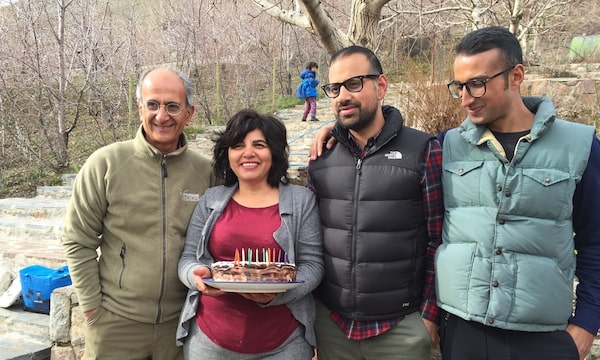
Kavous Seyed-Emami, left, his wife Maryam Mombeini and their sons Ramin and Mehran.Picasa/Courtesy of Kavous Seyed-Emami/Kavous Seyed-Emami
Foreign Affairs Minister Chrystia Freeland called her Iranian counterpart directly and demanded he help resolve a high-profile consular case involving an Iranian-Canadian widow that has become a source of tensions between the two countries.
After months of requests from Canada, Iranian Foreign Minister Javad Zarif finally agreed to speak with Ms. Freeland by phone on May 22. Ms. Freeland said the call centred on what has become the sole focus of Canada’s recent talks with Iran: the consular case of Maryam Mombeini, an Iranian-Canadian dual citizen who was barred from leaving Iran earlier this year after her husband’s suspicious death inside Tehran’s notorious Evin prison.
Speaking to a parliamentary committee Wednesday, Ms. Freeland said she demanded Iran release Ms. Mombeini during the call with Mr. Zarif.
“Any contact that Canada has with Iran has to be focused on the terrible plight of Maryam Mombeini. She is a widow, she is a Canadian citizen, her sons are in Canada and she has not only had to live through the terrible and tragic death of her husband, but she is now barred from leaving Iran,” Ms. Freeland said.
News of the call between the foreign ministers, who previously met on the sidelines of the United Nations General Assembly in New York in September, comes as Group of Seven leaders prepare to meet in Charlevoix, Que., on Friday and Saturday. A senior Canadian government official, who asked not to be named because of the sensitivity of talks, said that while G7 talks on Iran will likely focus on the U.S. withdrawal from the Iranian nuclear deal, Ms. Freeland is eager to discuss Ms. Mombeini’s case.
Ms. Freeland has repeatedly urged Iran to allow Ms. Mombeini to leave the country. Iranian authorities barred the widow from leaving on March 8 when she tried to flee the country with her adult sons after her husband, Kavous Seyed-Emami, died in prison.
Prof. Seyed-Emami, who taught sociology at a Tehran university and directed a wildlife foundation, was arrested at the end of January on what his family says were unsubstantiated allegations of spying.
The Seyed-Emami family – all Iranian-Canadian citizens – decided to flee Iran because they were facing harassment, threats and smear campaigns for rejecting Iranian authorities’ claim that Prof. Seyed-Emami died by suicide.
However, Iranian authorities confiscated Ms. Mombeini’s Iranian passport at the airport, moments before she was scheduled to board a Vancouver-bound flight with her sons. She told her sons to board the plane without her and has not been allowed to leave Iran since.
Ms. Mombeini’s case made news amid an effort by the Trudeau government to re-establish diplomatic relations with Iran, which were severed in 2012 when the former Conservative government kicked Iranian diplomats out of Canada and closed the Canadian embassy in Tehran.
However, Canada halted re-engagement discussions when Ms. Mombeini was barred from leaving the country. The Canadian official said talks won’t resume until Ms. Mombeini is allowed to leave Iran.
The official said Canada continues to use all diplomatic channels at its disposal, including its mission at the United Nations, to push for Ms. Mombeini’s return to Canada. Italy, which has served as Canada’s diplomatic representative in Iran since relations broke down in 2012, is also helping with the case.
Ms. Mombeini’s son, Ramin Seyed-Emami, has said the intelligence arm of the notorious Islamic Revolutionary Guard Corps – the same agency that arrested his father earlier this year – has opened a national-security case against his mother. He said the case is centred on unjust accusations of espionage.
Last month, Ms. Mombeini was admitted to hospital after suffering anxiety attacks stemming from her ordeal.